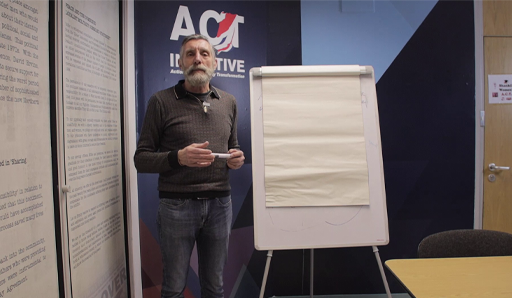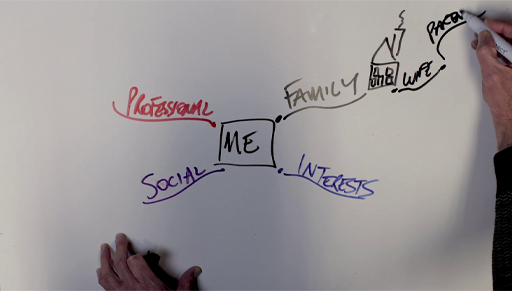4 Community, your choices and you
Sometimes, your past can shape how you view the present and how others view you. Where you come from, the context in which you grow up, and how other people see you, can affect your options and the choices you make in all sorts of unexpected ways - some positive and some negative.
As you have seen from the boys’ film about the Shankill, how people see you and your local community can be used to define you and people’s expectations of you. It can also shape how you see yourselves, both positively and negatively. Let’s think about how you might describe what community means to you now.
One way to help you explain what community means to you is to draw a ‘mind map’. This map could include streets or places, people past and present, relationships with friends, family, places to go, things to do, the past and how it affects you and so on, all around the central idea or topic of community.
Mind-mapping was invented by Tony Buzan (1942–2019), an author who has explored ways in which people think and learn. This is a tool to help you open your mind, think more creatively and come up with new ways of looking at things.
You can also watch this short film on doing a mind map.

Transcript: Video 4: William’s explanation of a mind map
Mind maps are often very personal – they are, after all, maps of your mind. For example, take a look at this short video of William doing his mind map of ‘me’.

Activity 11: Mapping your community
Now take a blank piece of paper to create a mind map of what community means to you. When you have finished take a picture of it to keep. If you prefer to do a word-based map without colour or pictures, you can use this online mapping tool. Don’t forget to save your map.
Discussion
Everyone’s community mind map will be different. As an example, your understanding of community might have multiple meanings and be both negative and positive – violence, segregation, local alienation as well as peace and global connections and belonging.
Community, or the sense of belonging you feel with others, can be about where you live, or from having a shared history in a place. It can be about something you cannot see or directly experience yet it is there nevertheless, such as a shared social identity or culture or shared values and can exist over time and across generations. It can also be about how other people see you and other people’s expectations of you based on this.
By mapping what community means to you, you can understand how these different ideas of community might shape your action and choices. By stepping back and reflecting on what community means to you, you can also begin to create your own understanding of community and change the role you play. In Session 2, you will explore some of the reasons why you make the choices you do, develop your skills for thinking critically and develop skills to help you make the right decisions for you.
Activity 12: Time to reflect
Before you finish this session, take a moment to reflect again on the question ‘Who am I?’ which was posed in Section 2. What have you learned about yourself and your place within your community or communities?
